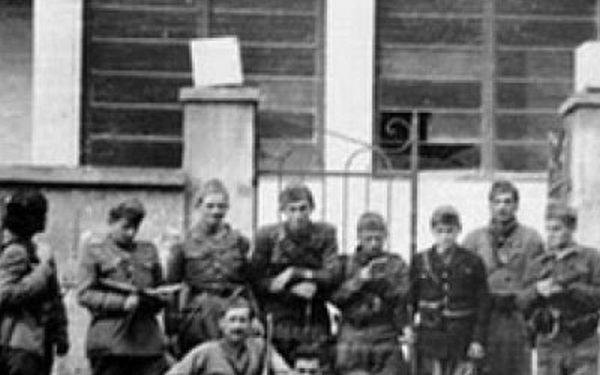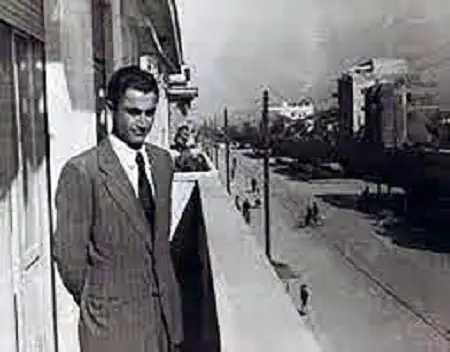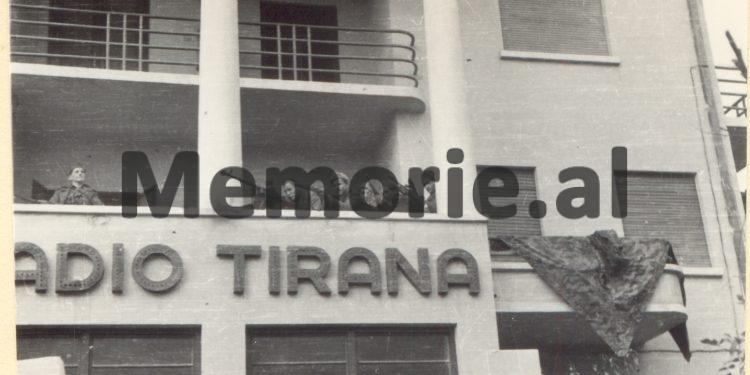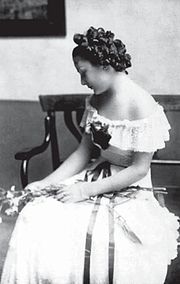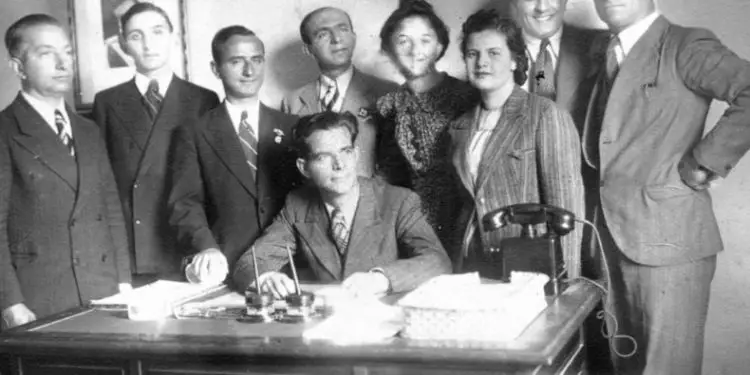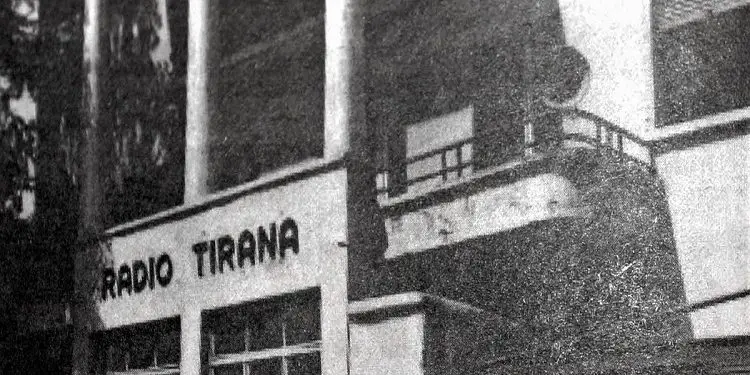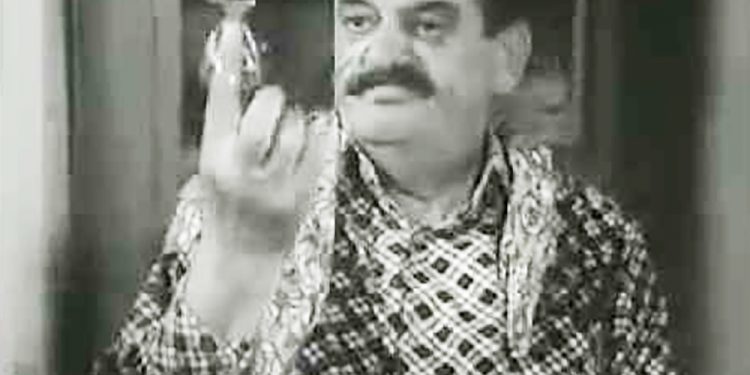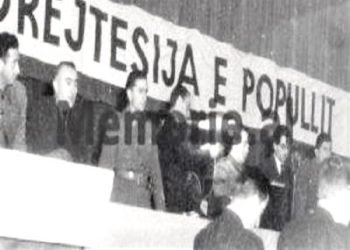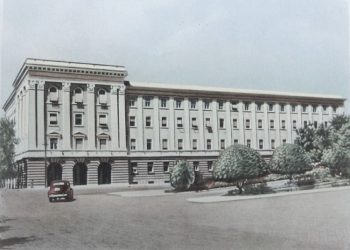From Skifter Kelliçi
Second part
Memorie.al/ On November 28, 1938, on the occasion of the Independence Day, in a ceremony attended by important authorities of the country, with a speech held on the microphone of Radio Tirana, King Zog the First inaugurated the establishment of this the institution, which over the years became so beloved and popular even for Albanians abroad. On this occasion, we are publishing the dossier ’85 years of Radio Tirana’, prepared by journalist and writer Skifter Këlliçi, who worked for 40 years at Radio Tirana (1959-1999), first as an editor and then as a sports commentator.
Continues from last issue
However, this great help of his, as well as of the first collaborators of Radio-Tirana, was completely denied after the arrival of the communist regime in power. It reached such a point that even the date of creation of Radio-Tirana, November 28, 1938, when King Zog delivered his inaugural speech on this occasion, was denied.
As the date of creation of Radio-Tirana, November 28, 1944 was taken, when the dictator Enver Hoxha, spoke on the microphones of this radio in the big demonstration, held on the occasion of the liberation of Albania on the ” Martyrs of the Nation ” Boulevard. Four years of activity of Radio-Tirana, as we will see in the next parts of this cycle, were denied.
This vulgar injustice was put in place on November 28, 1993. At that time, as I wrote above, I had just started to write the “History of RTSh, (1938-1990)”. In a conversation with Skënder Buçpapajn, the then director of this institution, we agreed to organize a solemn meeting on the occasion of this great event in the history of our culture. That’s how it happened.
After the speech I delivered at this meeting, Viktori Xhaçka, singer and then music editor at Radio Tirana, brought her memories from her life and work at Radio in the years 1938-1944, where on the first day of its foundation, as member of the girls’ choir of the “Nana Mbretneshë” Institute, had started to become active together with other artists.
Since then, November 28, 1938, rightfully entered history as the date of creation of Radio-Tirana…! And it will remain so forever, although in 2003, the later leaders of RTSh, at least in news broadcasts, did not mention the 65th anniversary of the creation of Radio-Tirana, which had become a tradition after the establishment of the system democratic. Even, as I will write in the last part, they left in complete silence the publication of the book ” History of RTSh “, which was published in 2004, which was supposed to mark a significant event for this institution.
Radio-Tirana during the fascist occupation
While the fascist troops were rapidly preparing the invasion of Albania in those first days of April 1939, the most powerful calls for the people to rise up and fight against the invader were heard from the microphones of Radio-Tirana. This is evidenced by an article published in the newspaper “Union of the Nation “, on April 9, 1944, entitled “Memories of Radio Tirana, and April 7, 1939”, which, among other things, states:
“Radio Tirana in the fateful days was reported to be more valuable than it can be believed, even much more valuable by the greatness of General Aranit, who remembered that with the collapse of the Shijak Bridge he fulfilled his duty, so Radio-Tirana paid it in full its task. In Berlin, London, even there in Rome, the very voice of the Albanians spread by its microphone left a deep echo. In many civilized countries, the news spread by Radio-Tirana, caused special editions in the most everyday voice.
Albania in those critical moments was able to say its word”. “The echo of Radio Tirana, on that Black Friday, – continues the article, – was bigger and stronger in the Balkan capitals and especially in Bucharest, Istanbul, Sofie, where he lives in a majority of exiled Albanians, burned and destitute for the motherland”.
These calls were made first by the director of Radio Tirana, Gjergj Bubani, the director of ATSH, Mihal Sherko, the sports commentator, Anton Mazreku, and even by the prime minister, Mehdi Frashëri.
But resistance was futile. Albania fell under fascist rule. Also culture, art, propaganda. Radio Tirana was not excluded either, which immediately came under the control of the invaders…!
To show the world that they are not occupiers, the fascists on April 14, 1939, as the newspaper “press ” reports, began to broadcast programs in all Balkan languages: Serbo-Croatian, Greek, Bulgarian, Romanian, Turkish as well as French, English, in which the invasion was described as the “liberation” of Albania.
“Our country has thus won the record in foreign languages among the radio stations of the Balkans,” continued “press “, on the same date. Of course, those two rooms in the City Hall of Tirana were too small for the intentions of the invaders, who after a few months transferred the Radio to a new building, on “Kont Urani” street, at a bend of “Kavaja Street” where it remained as such until December 5, 1965.
The new building of Radio-Tirana began to be equipped by Italian specialists with the most modern equipment of the time. As the “Fascism” newspaper announced on December 29, 1939, in an article entitled: “Radio-Tirana a fascist act”, the representative of the Albanian government, Xhafer Ypi de Valauri, the chairman of EIAR-I, (Ente Italiana Audio Radio), signed an agreement, for the installation of a powerful station with a power of 50 kv, which would transmit in medium wave.
“Albania will have one of the most powerful stations in the Balkans”, – announced this newspaper, echoing the above agreement. According to this newspaper, “all radio broadcasting services in Albania would be strengthened, which with the establishment of the new station, would be distributed by one of the most powerful and modern stations in the Balkans”.
At the same time, the two studios located on the third floor of the new Radio building were further modernized, the bi-weekly magazine ” Radio program ” began to be published, which was then called “Radio- Tirana magazine ” and more after “Albanian Hearth”. In these magazines, Radio-Tirana programs were published, as well as cultural-artistic and literary columns.
Of course, fascist propaganda materials were also published. This was undeniable. However, the magazine became a reflection of Albanian and world intellectual thought. This magazine ceased publication in September 1944.
To understand what propaganda the fascists did for Radio-Tirana, it is enough to mention an article published in the first issue of the magazine “Radio-program” (April 11, 1940), entitled “A year of life at Radio Tirana”, where it was written: “Inside a place a few meters square, a black platform against the wall. In one corner, a small table, a piece of white iron, microphone, and parts of canconettes….typed letters.
A blond-haired boy, drowning in sweat, expresses himself with many gestures and few words…! On a chair, a few dozen discs worn out from use. A hot one that takes your breath away. Outside 37 steps in the shade. Within 40 degrees…! It was the Radio-Tirana center here a year ago. Today, on the street ‘Kont Urani’, a small and pleasant building is the center of the Radio’s services, with all its harmonious and resounding activities, which begin in the morning and continue until late in the evening.
Courses were set up for the professional training of the Radio’s creative staff. One of them was the course for the preparation of speakers, led by the speaker Kaliopi Plasari, the school for the preparation of singers was led by Tefta Tashko and the pianist Tonin Guraziu, together with the Italian musician, Mario Etore. There was also a guitar course and then a school of instrumentalists, where Nikolla Zoraqi, Ymer Skenderi and Genc Bogdo took their first steps, who later became well-known musicians and composers.
The well-known Italian engineer, Antonio Galeaci, who, together with the pianist Mario Etore, stayed in Albania until 1948, providing significant help in the development of Radio-Tirana, helped with the technical development. Among the most popular shows, we mention the programs of the modern orchestra directed, in addition to Mario Etore, by the other Italian conductor, Sardelli, “Radio Posta”, show with music requested by the listeners, ” Happy hour “.
There were also other interesting shows such as: “Children’s Hour”, “Letterary Hour”, where well-known works of Albanian and world literature were read and discussed. Shows of interest were also those with a cultural and scientific character, commemorative shows for great Albanian and foreign figures, where personalities of Albanian culture and art collaborated.
Without a doubt, among the most listened to programs of Radio-Tirana, was the “Doctor’s Hour”, which you started in the first weeks of the creation of Radio-Tirana by Dr. Hamdi Sulçebe, the longest-running Radio-Tirana show that he continued until the last days of his life, if we consider that it continued for more than 50 years. “Sports Chronicle”, prepared by the well-known radio journalist, Anton Mazreku, was also followed with great interest.
Although in the severe conditions of the fascist occupation, when the programs of Radio-Tirana also took place in the Italian language, such as; news, comments, learning the Italian language, especially programs of light music, still, Radio Tirana tried to preserve national features. This was seen, apart from those we mentioned above, also in the music shows that made up the vast majority of the Radio’s programs.
This is also confirmed by a report on the activities of Radio Tirana, during the first 6 months of 1943 (State Archives, File 12, page 198), where it is emphasized that work was being done to collect the melodic notes “that will create the song Albanian, bringing it back in a new form, but which will flow by itself and summarize the entire melodic folklore of the country. To start these actions, a summary and a review of the first Albanian motifs was made in the volume “Albanian Life”, volume which is spreading throughout Albania”.
In the cultivation of Albanian folk music in Radio-Tirana, the creation of the Toska group and the characteristic Shkodran group, with the well-known singer, Kel Sata, the group of men directed by Mihal Ciko, (well-known singer and head of the music sector at Radio) played a role. , group that became very popular.
It should also be mentioned the initiative taken by the well-known singer Tefta Tashko, a Radio employee, who in 1942 went to Italy, where she recorded Albanian folk songs, which still have extraordinary value today. Among other well-known Radio singers, we mention soprano Marie Paluca, (Kraja), tenors; Kristaq Antoniun, Kostaq Koço, singers Bardhyle Nase, Merita Sokoli, Behije Cela, (Levonja), Viktori Xhaçka, who passionately sang Albanian folk songs.
An important place in Radio-Tirana’s programs was also occupied by classical music, which was conveyed to the listeners with records that came especially from Italy. In addition, chamber music concerts, concerts of small orchestras, characteristic ensembles and accordion ensembles were also given on the radio. In those years, our listener had the opportunity to listen to well-known symphonic pieces performed by the Orchestra of the Italian Armed Forces, which were mainly broadcast by Radio-Tirana.
In an article published on July 14, 1943, in the “Tomori” newspaper, it is noted that Radio-Tirana had broadcast “…about twenty great symphonic concerts from the best, summarizing pieces of classical music, from the most the best, pieces by classical authors of the past, and by the greatest and most remarkable of our time…including five of Beethoven’s most famous symphonies”.
In this way, the range of activities of Radio-Tirana increased a lot. For this purpose, sectors such as broadcasting were created, which included information, the foreign languages sector, the programming sector, the drama group, which we will talk about later, the technical sector, the music sector, and various sections. , where about 50 people were active, a large figure for those years.
On April 16, 1943, the newspaper “National Guard” announced that in Kashar, a powerful station of 50 kv., from 3 kv. with whom Radio-Tirana worked, but this project failed, because Fascist Italy capitulated in the summer of 1943.
However, even with that small capacity, Radio Tirana, as we saw, was making progress. That’s why I come to put my lips in gas, when in a file stored in the Archive of RTSh about the history of Radio in the first years, it is written:
“Radio Tirana, which was put into operation in November 1938, like all the bourgeois and reactionary press of that time, was in the hands of the feudal-bourgeois Zog clique and served class interests…! In terms of a radio limited primitiveness and ignorance of the regime, Radio-Tirana was used as a tool to poison the conscience of the people and put their conscience to sleep…! The real service of the Radio, begins only after the liberation of the country from the Nazi-fascist occupiers, the overthrow of the feudal-bourgeois class and the establishment of popular power…”!
The conquerors change…!
After the capitulation of fascist Italy, in September 1943, their place was taken by the German invaders, who propagated that they would be passers-by in Albania, which was not part of their strategic plans. But, as you know, it didn’t happen like that. Everything was put under their strict control. Also Radio-Tirana.
This is proven, among others, by this fact: Within a month of their arrival, through the agents who served the German invaders, they became aware of an anti-fascist cell operating in Radio-Tirana, where its employees were part of. among whom Muharrem Pirdeni, Todo Bojdani, Tasi Kanxheri, Nazim Batalli, Spiro Qirko, Hysen Pelingu, Kaliopi Prifti, etc.
And suddenly, in Radio-Tirana, a group of German soldiers, commanded by an officer, took control of those employees who were found there at that moment, among whom was the director, Gjergj Bubani. Then he ordered other officials to appear there immediately. And when they came, they forced them all into a truck and drove them to a suburb of Tirana, where they were told that if they didn’t tell who the anti-fascists were on the radio, they would be shot.
I don’t want to go on, because I recently wrote about this event in the book “Çelentano, me and the police”, but, according to Behije Çela, (Levonja), what happens in this group, only the cold-bloodedness of Gjergj Buban, as well as the explanation that was given an acquaintance of his who was a confidant of the occupiers told the Germans that there were no anti-fascists at the Radio, resulting in the release of all the employees.
The new invaders did not openly interfere in the affairs of Radio-Tirana, but they requested that radio shows be included in its programs, in order to propagate their goals. Thus, in October 1943, news in German began to be broadcast twice a day, and from January 1944, the show “For Germans”, which was then called “German Hour”.
However, the previous columns we talked about before continued to be broadcast regularly. New sections were even created, such as “Two words with the listeners”, ” You know the merfil…”, programs with folk songs from Shkodra, labe, songs sung by the men’s choir, directed by Mihal Ciko, as well as operatic parts, continued to be broadcast and symphonic.
A German military symphony orchestra was also included in the musical activity. According to Mihal Ciko’s oral recollections, the Germans requested that Albanian orchestra members be part of this orchestra, but at the behest of the Anti-Fascist Council of Tirana, they withdrew.
The same thing happened with the sports commentator, Anton Mazreku, who was asked by the German military to commentate on Radio-Tirana, the match Sport-Klub “Tirana”, with their military team “Vermaht Aushvald”, which took place in June of in 1944, in the field of “Shallvares”. Again by order of the Anti-Fascist Council, Mazrek found ways to avoid this invitation.
One of the successful innovations of Radio-Tirana during this period was the activity of the philodrama group that prepared and presented well-known theater pieces. In this group, Behije Çela, (Levonja), Liza Vorfi, Mihal Popi, Xhevat Serezi, who later became well-known actors, as well as stage painters, Qamil Grezda and Hasan Reçi, also became prominent in this group outstanding scenographers.
Here is what is written in the newspaper “Union of the Nation”, dated June 12, 1944, after several performances of this group at the “Kosova” Theater, now the National Theatre: “The philodramatic microphone group of Radio-Tirana, without pretending to be a bombastic advertisement, was presented as befits true art, simple and serious. But precisely this simplicity did it even more honor, and was a sensation for us. A drama and two comedies. Three parts performed by four women and three men”.
And here it was about; Evanthi Cikon, Bardhyle Nasen, Meri Hariton… Kostaq Nasen, Mihal Stefën, etc., especially in the comedy “Doktori pa dorashka”, directed by Mihal Cikos. During 1944, the activity of Radio-Tirana was reflected in the magazine “Albanian Hearth”, which, as mentioned above, was the continuation of the magazine “Radio Tirana”, and “Radio-program”.
This magazine continued the previous tradition, publishing the biweekly program of Radio-Tirana. It also became an attractive tribune of the artistic and cultural life in Albania. Memorie.al
Next issue follows




